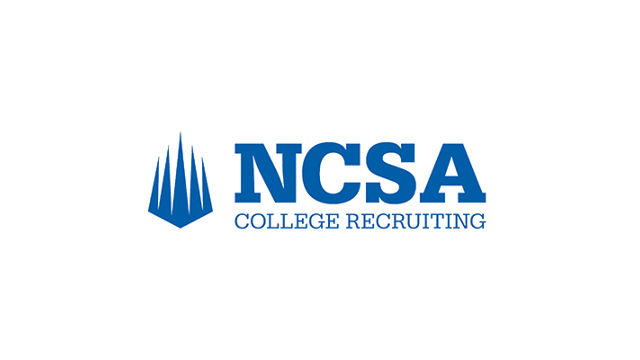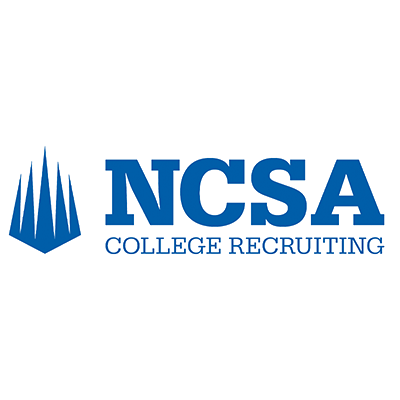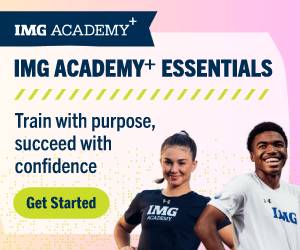NCSA College Recruiting

To help our athletes navigate the complicated recruiting process, we’ve partnered with NCSA College Recruiting, Over the past 20 years, NCSA has refined the tools that student-athletes need during the college recruiting process to find their college match. Using hands-on guidance, college matching tools, and a network of 35,000+ college coaches, more than 200,000 student-athletes have made commitments to their college choice. Every day, the 750+ former college coaches and athletes at NCSA are helping high school athletes:
- Gain exposure and get discovered by college coaches
- Ensure they are on track to become NCAA and NAIA-eligible
- Effectively contact and communicate with college coaches
- Find the best schools based on athletic and academic goals
The following information will help athletes and their families better understand what the recruiting process is and how to put together an effective recruiting game plan.
Connect with college coaches and find your best college match.

There are three common mistakes athletes and families tend to make when it comes to recruiting:
- Assuming someone else is handling their recruiting. While your high school or club coach and parents will play a big role in your recruiting, you will have to put in the time and effort to find the right program for you and connect with college coaches.
- Not putting enough emphasis on academics. Talent and athletic ability will catch a college coach’s attention, but below-average academics will seriously limit your recruiting options.
- Not exploring all opportunities. It pays to seriously explore all of your options. Many athletes start with just one or two target schools in mind, only to find a college they love that wasn’t even on their radar.
While recruiting efforts vary across college programs at every division level, coaches tend to follow the same steps when recruiting talent. The following outline gives a very basic look at how most college coaches approach the recruiting process.
- Determine recruiting needs (position, grad year)
- Search online recruiting networks to evaluate recruiting profiles
- Connect with high school and club coaches to learn about prospects
- Evaluate prospects’ video, academic information, and social media accounts
- Begin to contact athletes, follow profiles, extend camp invites, and host camps
- Meet with recruits’ families and current coaches
- Check NCAA and NAIA eligibility status, extend official visit offers
- Make initial verbal offers
- Sign players, look for last-minute recruits or transfers
The NCAA recruiting rules and calendar outline how and when college coaches and recruits interact using four different periods: contact, evaluation, dead and quiet.
Contact period: During this time, coaches and athletes are free to communicate via email, text, phone call, direct message, as well as in-person on campus, at tournaments and/or at the recruit’s school and home. For most sports, coaches can begin reaching out to athletes starting June 15 after sophomore year.
Evaluation period: The NCAA evaluation period is a specific time when college coaches are allowed to watch an athlete compete in person or visit their school. However, coaches are not allowed to communicate with that athlete (or parents) off the college campus.
Dead period: During a dead period, all in-person contact between college coaches and recruits is strictly prohibited, meaning coaches are not able to talk to recruits on-campus, at their high school, at sports camps or even when running into them while out.
Quiet period: College coaches are prohibited from off-campus in-person contact with recruits or their families during a quiet period. This means coaches cannot watch athletes compete in-person, visit their high school, or talk to them at their home.
One of the most common misconceptions in college recruiting is that the process doesn’t start until coaches can contact recruits. Athletes who wait until the official contact date to start connecting with colleges will be busy playing catch up while other athletes are actively building relationships with college coaches.
To avoid falling behind in the recruiting process, high school athletes should begin reaching out to college coaches as early as freshman year. Below are a few tips for connecting college coaches via email, phone and social media.
Email: A great way to get on a coach’s radar is by sending an introductory email. Before hitting send, make sure you’ve done your homework about the coach, the school and the program. You should be able to explain why you are interested in the school and how you could contribute to the team. Don’t forget to include your basic athletic information, GPA and contact information, as well as a link to your NCSA Recruiting Profile.
Phone: As you can imagine, a coach’s email is often stacked with incoming emails. What many athletes don’t know is that coaches receive very few phone calls from recruits. A phone call is a great way to introduce yourself and make a memorable impression. Before the contact period officially starts, college coaches won’t be able to talk with you over the phone, so be prepared to introduce yourself in a voicemail.
Social Media: Platforms like Twitter and Instagram offer athletes another way to reach out and connect with coaches. Athletes should only use these platforms if they are active and monitor the channel regularly (so you don’t miss any messages). Be cautious when posting to your profile to ensure nothing questionable shows up on your account.
Not only do college coaches look for well-rounded student-athletes who are committed to both athletics and academics, but recruits must meet the academic eligibility requirements to compete at the college level. Whether you’re looking to compete with the NCAA or NAIA, starting freshman year, work with your guidance counselor or advisor at your high school to make sure you have met the requirements upon graduation.
As you begin to narrow down your college options to a list of roughly 5 reach, 20 target and 5 safety schools, it’s important to answer the following questions:
Education and Major: Is there a field of study you are passionate about?
Geography: Would you like be close to home or across the country?
Experience: Do you want to compete all four years? Do you want a sport and social balance?
To help you through this process, we suggest using the NCSA Power Rankings, which lists the best college programs in each sport based on important factors, including size, location, academics, and cost, just to name a few.
Finding your best fit means really taking a close look at all the schools that offer what you’re looking for athletically and more importantly, academically. The goal is a four-year degree and you should ask yourself if you could be happy attending a school even if you could no longer play your sport.
NCSA Recruiting Profile
College coaches begin their recruiting process online, so the first step to connecting with college coaches in creating a recruiting profile. Every recruit’s profile should be completed with the following information:
- Name, high school, grad year, position
- Physical stats (i.e. height, weight)
- A key sport measurable (i.e. 40-yard dash time)
- Your high school transcript with GPA and ACT or SAT scores
- Highlight video (if applicable)
NCSA provides a free recruiting profile to all of our members. More than 35,000 college coaches actively search NCSA profiles every year looking for athletes to fill their open roster spots.
Highlight Video
Highlight video is a valuable recruiting tool for college coaches, especially for those who are unable to easily watch recruits compete in person. A strong highlight video is between 3–5 minutes long, includes 20–30 clips from game footage and includes the athlete’s contact information at the start and end of the video. To make sure highlight video is easily accessible for coaches, upload your video to your NCSA Recruiting Profile and YouTube.
One of the necessary parts of any well-rounded recruiting process is attending camps, combines, showcases and tournaments. These events give college coaches the opportunity to watch a large number of recruits in a single place and allow top recruits to compete against one another. The challenge for any family is deciding what events to attend. Here is a guide for understanding the value of different recruiting events:
- College camps: The camps hosted by individual colleges are great opportunities to get in front of a specific program. That said, you want to make sure you have a legitimate chance with any school before you invest in attending their camp.
- Third-party camps: The goal of these events can range from pure skill development to “made for recruiting” events where top recruits are brought in to compete against one another. Just be sure you are clear on what you want to get out of any camp you are attending and make sure that is what that camp is going to provide.
- Combines: Coaches in many sports are starting to rely more and more on standardized athletic numbers like 40-time (football) and 60-yard time (baseball), for example. It is a great idea to get your combine numbers once or twice a year from events where coaches trust the stats are verified and accurate.
- Showcases: These are made for recruiting events, popular in many sports. Whether conducted by your club or a third party, these events attract several college coaches who all come to watch a group of recruits run through drills and compete. Make sure the coaches you are interested in or would be interested in are attending any showcase you would consider attending.
- Tournaments: Large tournaments have become the go-to recruiting events for many college coaches. Once you have decided on an event, make sure you contact coaches prior to the start to let them know you will be attending and always follow-up with coaches afterward.
The above briefly covers the college recruiting process and NCSA’s role in helping student-athletes get recruited. Having this knowledge now will help get your recruiting effort off to a great start. If you have any more questions or would like more information about getting your recruiting plan in place, you can contact NCSA’s team at 1-866-495-5172.
Build the mindset and skills to thrive [3 Months Free of IMG Academy+ Essentials]
At NSHSS, we know that success in sports goes beyond the classroom and field. That’s why we’ve partnered with IMG Academy+ to offer three free months of IMG Academy+ Essentials. Essentials is a powerful online platform with everything you need to take your game further. You’ll learn from IMG Academy coaches on topics tailored to help you achieve wins in all aspects of your life, like mental performance, confidence, nutrition, leadership, and trending topics like NIL.
Use code NSHSS25 at checkout!
